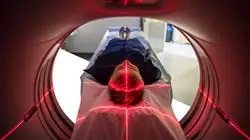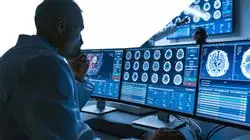University certificate
The world's largest faculty of medicine”
Introduction to the Program
Thanks to this Postgraduate certificate you will be able to know in detail the essential foundations of Neuroanatomy”

Solid knowledge in neuroanatomy has a positive influence when it comes to achieving optimal results in diagnosis and in the application of truly effective treatments in patients with neurological pathologies. The latest information in this field is therefore essential for medical professionals who wish to be aware of the latest advances in this specialty. That is why this Postgraduate certificate was created, in which students, thanks to a teaching team with extensive experience, will achieve the renewal of their knowledge in the field of neuroanatomy.
Professionals are facing a program that is taught exclusively online, which will allow them to reconcile their work and/or personal responsibilities with quality teaching. This program will be enriched through a syllabus with a theoretical-practical focus on the conformation of the central nervous system (CNS) and neurons, the different types of synapses and neurotransmitters. Besides, it will delve into neuroendocrinology and neuroimmunology, with special emphasis on the characteristics of the CNS at different stages: from childhood to adolescence and until old age.
The simulations of clinical cases provided by the specialized teaching staff will be of great help to the professional, since through them they will be able to approach to a reality that can be useful in your daily practice. An excellent opportunity for professionals who want to update their knowledge with content that is characterized by using the latest technology in education. You will have summaries, detailed videos, interactive diagrams or specialized readings available from the very start. Having the entire study plan from the beginning will facilitate the distribution of the study load, always according to the needs of the students themselves. A program according to current educational times and that is at the forefront.
An educational option that allows you to be aware of scientific studies that delve into the neuron and its characteristics”
This Postgraduate certificate in Principles of Neuroanatomy contains the most complete and up-to-date scientific program on the market. The most important features include:
- The development of practical cases presented by experts in Psychology and Immunology
- The graphic, schematic, and practical contents with which they are created, provide scientific and practical information on the disciplines that are essential for professional practice
- Practical exercises where the self-assessment process can be carried out to improve learning
- Its special emphasis on innovative methodologies
- Theoretical lessons, questions for the expert, debate forums on controversial topics, and individual reflection assignments
- Content that is accessible from any fixed or portable device with an Internet connection
Increase your knowledge about the conformation of the nervous system in a more agile way with the application of the Relearning system of TECH Global University”
The program’s teaching staff includes professionals from the sector who contribute their work experience , to this educational program, as well as renowned specialists from leading societies and prestigious universities.
Its multimedia content, developed with the latest educational technology, will provide the professional with situated and contextual learning, i.e., a simulated environment that will provide an immersive education designed to learn in real situations.
This program is designed around Problem-Based Learning, whereby the professional must try to solve the different professional practice situations that arise throughout the program. For this purpose, students will be assisted by an innovative interactive video system developed by renowned experts.
Download the agenda and view its content whenever you want. You are facing a flexible program that adapts to you"

A Postgraduate certificate that will go in depth into the latest scientific evidence related to the peripheral nervous system"
Syllabus
The syllabus of this Postgraduate Certiciate is made up of innovative multimedia content and a Relearning system, that will favor the updating of knowledge in a more visual and dynamic way. Thanks to this, professionals will obtain the most recent information related to the area of neuroanatomy. In addition, they will have hours of high-quality additional material with which they can delve into the different sections in which this study plan is structured. In this way, they will get an academic experience that provides them with the most recent knwoeldge in neuroanatomy.

Delve into the main nervous system problems associated with old age”
Module 1. Principles of Neuroanatomy
1.1. Formation of the Nervous System
1.1.1. Anatomical and Functional Organization of the Nervous System
1.1.2. Neurons
1.1.3. Glial Cells
1.1.4. Central Nervous System: Brain and Spinal Cord
1.1.5. Main Structures
1.1.5.1. Forebrain
1.1.5.2. Midbrain
1.1.5.3. Rhombencephalon
1.2. Formation of the Nervous System II
1.2.1. Peripheral Nervous System
1.2.1.1. Somatic Nervous System
1.2.1.2. Neurovegetative or Autonomic Nervous System
1.2.1.3. White Matter
1.2.1.4. Gray Matter
1.2.1.5. Meninges
1.2.1.6. Cerebrospinal Fluid
1.3. The Neurone and its Composition
1.3.1. Introduction to the Neurone and its Function
1.3.2. The Neurone and its Composition
1.4. Electric and Chemical Synapses
1.4.1. What is a Synapse?
1.4.2. Electrical Synapse
1.4.3. Chemical Synapse
1.5. Neurotransmitters
1.5.1. What is a Neurotransmitter?
1.5.2. Types of Neurotransmitters and their Functioning
1.6. Neuroendocrinology (Hypothalamus-Endocrine System Relationship)
1.6.1. Introduction to Neuroendocrinology
1.6.2. Basis of Neuroendocrinological Functioning
1.7. Neuroimmunology (Relationship between the Nervous System and Immune System)
1.7.1. Introduction to Neuroimmunology
1.7.2. Basis and Fundamentals of Neuroimmunology
1.8. Nervous System in Childhood and Adolescence
1.8.1. Development of CNS
1.8.2. Bases and Characteristics
1.9. Nervous System in Adulthood
1.9.1. Bases and Characteristics of the CNS
1.10. Nervous System in Old Age
1.10.1. Bases and Characteristics of the CNS in Old Age
1.10.2. Main Related Problems

A Postgraduate certificate that gives you the opportunity to recycle your knowledge about the nervous system in childhood and adolescence”
Postgraduate Certificate in Principles of Neuroanatomy
Thanks to neuroanatomy it is possible to study the structure of the nervous system. Understanding its principles is essential to understanding how the brain and nerves function in communication and control of the body. If you want to specialize in this important health field, you've come to the right place. The Postgraduate Certificate in Principles of Neuroanatomy, created by TECH Global University, will provide you with the necessary basis to understand this enigmatic organ. Here, we propose an entirely virtual tour through various modules ranging from the organization of the central and peripheral nervous system, to its structures: cerebral hemispheres, cerebral lobes, cerebral sulci and gyri, motor or sensory areas and the limbic system.
Gain knowledge about the principles of neuroanatomy
TECH is not only the best online university in the world according to prestigious media such as Forbes, but it is also home to one of the largest medicine faculties, where we are responsible for educating high-profile professionals to improve both their income and their healthcare practice. That is why we offer you the best postgraduate certificate you will find to optimize your curriculum. We guarantee quality lessons enhanced with advanced multimedia technology, case studies and total self-management of your time. Thanks to these advantages, you will learn in an immersive way everything related to the functioning of the brain, in terms of the different cognitive and emotional functions (perception, memory, language, attention, emotion, motor skills, sleep regulation). You will also analyze neurotransmission and brain plasticity, covering communication between nerve cells, the action of neurotransmitters, neuronal plasticity and the brain's ability to change and adapt. Finally, you will delve into major neurological pathologies and disorders, including Alzheimer's, Parkinson's, stroke and multiple sclerosis.







